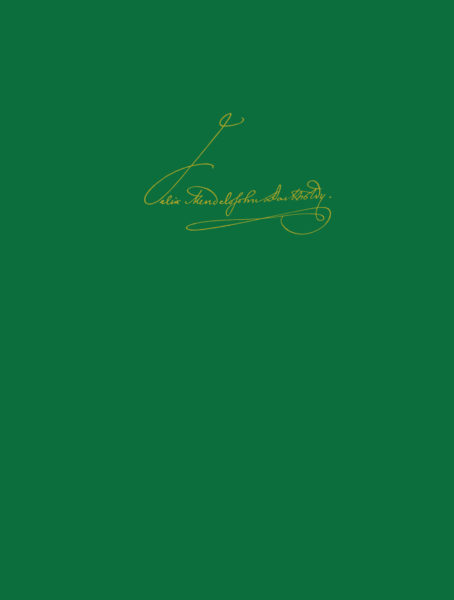Felix Mendelssohn Bartholdy (1809–1847) Leipziger Ausgabe der Werke von Felix Mendelssohn Bartholdy – SON 419
herausgegeben von der Sächsischen Akademie der Wissenschaften
304 Seiten | 25 x 32 cm | 1.479 g | ISMN: 979-0-004-80305-9 | Leinen, Fadenheftung
1828 war Dürer-Jahr (300. Todestag), und das Berliner Dürerfest suchte nach einem geeigneten Komponisten für die Festkantate. Der renommierte Carl Friedrich Zelter lehnte ab und empfahl stattdessen seinen Schüler, den 18-jährigen Felix Mendelssohn Bartholdy. Dieser sagte zu, und schrieb binnen weniger Wochen mit der Festmusik MWV D 1 sein erstes groß besetztes weltliches Vokalwerk. Danach geriet Mendelssohns Festmusik trotz der erfolgreichen Uraufführung in Vergessenheit. Der Anlass war wohl doch sehr speziell und das Libretto recht hölzern – und doch hatte der jugendliche Komponist sein Bestes gegeben, was sich nun erstmals gedruckt überprüfen lässt.
| Einleitung | ||
| 1. Öffne dich, des Tempels Pforte | ||
| 2. Rezitativ: Ihr kennt die Stadt im alten Frankenlande | ||
| 3. Chor: Albrecht Dürer, Albrecht Dürer ward er genannt | ||
| 4a. Arie: Heil! der Mutter großer Söhne! | ||
| 4b. Rezitativ (und Accompagnato): Nicht hat er sich den Kranz errungen | ||
| 5. Arie: O wie herrlich, o wie milde | ||
| 6. Rezitativ: Auch des Glaubens heil’ge Stärke | ||
| 7. Chor: Hoffnung lässt nicht zu Schanden werden | ||
| 8. Chor (und Rezitativ): Nehmt uns auf im Geist, ehrwürd’ge Hallen! | ||
| 9. Quartetto: Wie der Herr der Welt geboren | ||
| 10. Arie mit Chor: Manche Träne sah ich fallen | ||
| 11. Chor: O du herrlicher, du großer, gottbegabter Mann! | ||
| 12. Rezitativ: Lob und Ehre deinem großen Sohn | ||
| 13. Arie: Hohe Roma, reich die Sternenkrone | ||
| 14. Rezitativ: Strahle hoch im Sternenkranze | ||
| 15. Finale: Göttin mit dem Farbenbogen |










 Blättern
Blättern